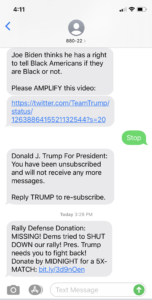Mobile Carriers Shutdown Trump SMS Program
Yes, the Trump Campaign has officially been blocked from texting via their peer-to-peer SMS program. Many of us in the digital organizing space have known for a while that the Trump Campaign and the RNC are bad actors within the text messaging space. When I lead mobile trainings I talk a lot about how bad actors make it harder for those of us running legitimate text outreach campaigns.
What is a bad actor? A bad actor is a mass texter that violates the Telephone Consumer Protection Act (TCPA) regulations enforced by the FCC or CTIA texting requirements enforced by Cellular Telecommunications Industry Association (ie. TMobile, Verizon, AT&T, et al).
The Trump Campaign’s texting program is the latest bad actor that has been called out for these violations:
The Cellular Telecommunications Industry Association said in a statement, “We expect all senders “” whether airlines, schools, banks or campaigns “” to include clear opt-out language and gain prior consent before sending a text… These simple steps help protect consumers from spam and maintain text messaging as a trusted medium for everyone.“ (Politico, 7/20/20)
In the Trump Campaign’s case, a source at another carrier suspects they used a blast platform with an autodialer to send messages from local phone numbers. The goal was to make it appear as if the texts were peer-to-peer, but the carriers likely noted there was clearly no replies or “back-and-forth” messaging occurring, and several customers likely flagged it as spam so they asked the CTIA to look into it. Once the CTIA learned of the violations the Trump voter and donor outreach program via an autodialer sans opt-in was shut down.
The telephone carriers can block texts from certain phone numbers (local, toll-free or shortcode) if they have evidence of spam texting, not adhering to text opt-out requests, or texting people who did not legally opt-in (only applies to broadcast texting), et al.
The Trump campaign’s broadcast texting program (Shortcode 88022) via Tatango is guilty of at least two of the three:
- Bulk/Broadcast Texting Without Consent: Three Minnesotans have filed a lawsuit alleging the Trump reelection

Photo courtesy of Alesa Mackool effort sent text messages without receiving consent to text them. A federal judge last month denied the campaign’s motion to dismiss the case. Mobile subscribers need to clearly opt-in, and when they do the organization or candidate needs to include the following Mobile Opt-In Disclaimer Language.
- Not Adhering to Text Opt-Out Request (ie. STOP, Remove): This (see image on right) is just one of what is likely many examples of the Trump Campaign continuing to text a mobile number despite a request to STOP receiving messages.
These are both clear TCPA violations, so besides getting their shortcode shutdown by the carriers, the Trump Campaign could be looking at a future CTIA shutdown on it’s shortcode, as well as FCC fines for each phone number texted despite not consenting to receive texts. Only broadcast texts (mass/bulk texting) are held to the TCPA regulations.
Peer-to-peer texting on the other hand isn’t required to comply to the TCPA. For a long time, it operated in a gray area, but the FCC has recently ruled that peer-to-peer texting does not require an opt-in, as long as texts are sent individually and not by an auto-dial or robo-dial system. That being said peer-to-peer texts still need to respect opt-out requests and avoid content that could be reported as spam. Learn more about the filters that carriers have in place to block peer-to-peer messages from being delivered.
Between COVID, the U.S. Census and the 2020 Election more and more organizations and campaigns are texting using both peer-to-peer and broadcast texting tools. It is even more important now that everyone remain compliant, otherwise the CTIA (ie. mobile carriers) and the FCC could create more restrictions on texting. Bad actors should continue to be reported and removed from the ecosystem.